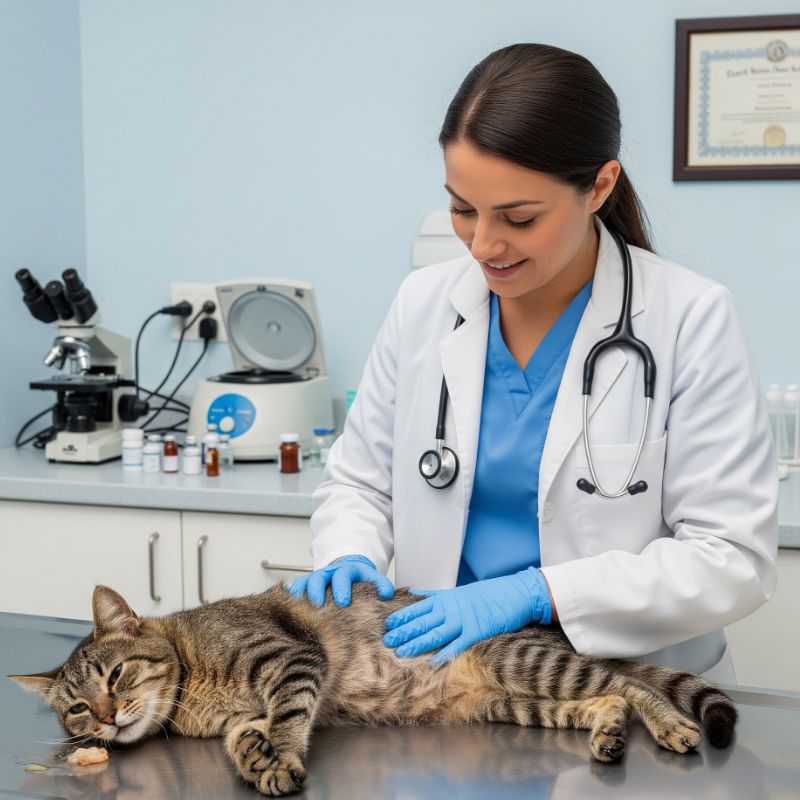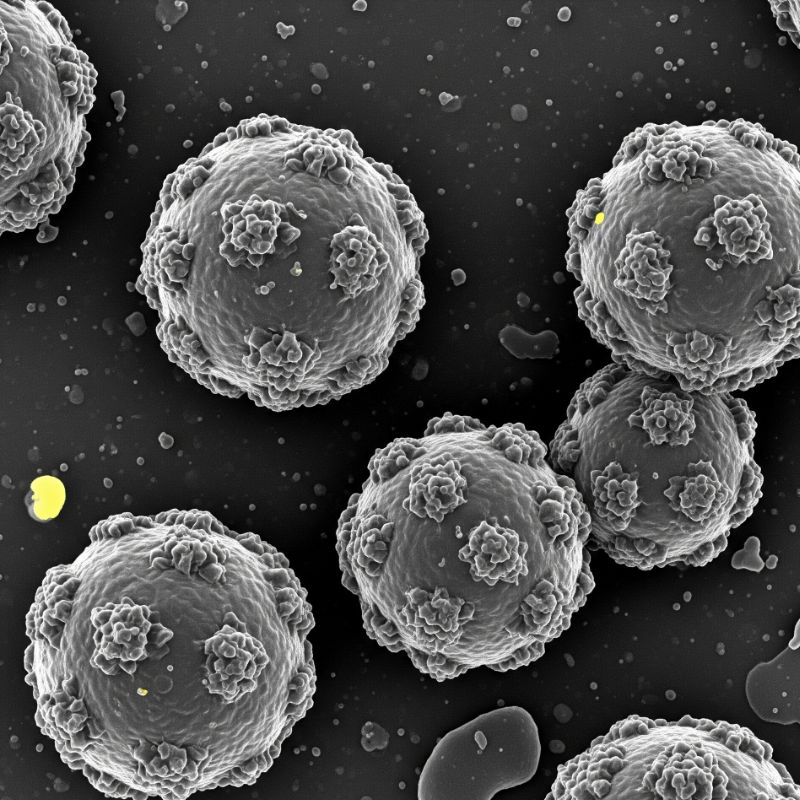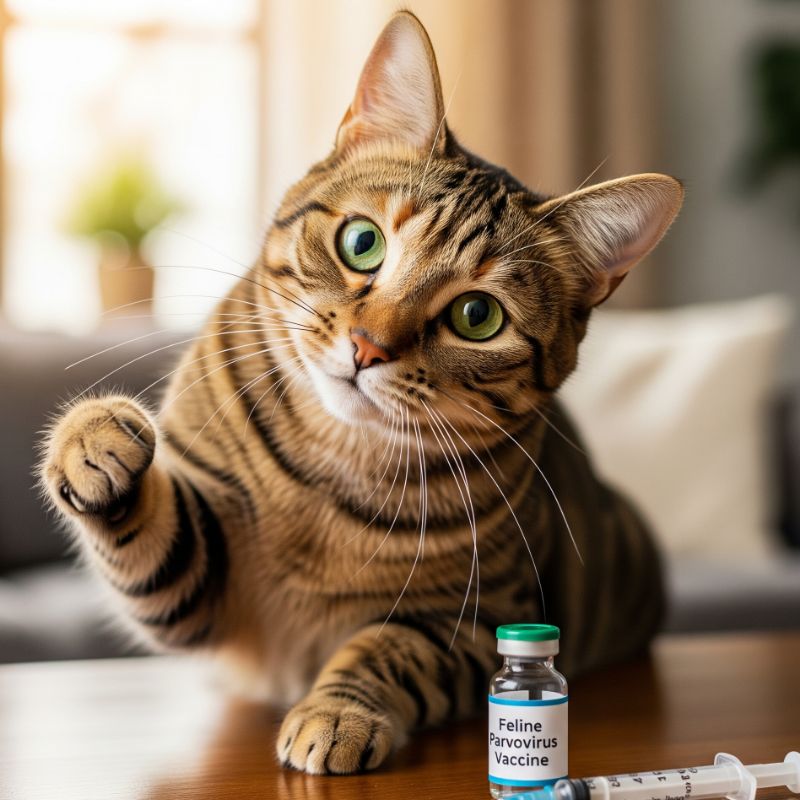There’s a palpable sense of fear that comes with the word “parvo,” and as a cat owner, one question immediately jumps to mind: can cats get parvo? You want a straight answer, and you want to know everything that follows—the risks, the signs, and exactly what you need to do to protect your beloved pet. This guide was built to address every single one of those worries. We will go through all the critical questions you have, providing clear, expert-backed answers to give you peace of mind and a solid action plan.
Can Cats Get Parvo?
Yes, cats can get their own distinct form of parvovirus, known as Feline Panleukopenia Virus (FPV). While it is not the same as the canine parvovirus that affects dogs, it is highly contagious and can be extremely dangerous, especially for kittens and unvaccinated cats. So, the direct answer to “can cats get parvo?” is a clear and definite yes.
What Exactly is This Parvovirus?
Feline Panleukopenia (FPV) is a severe viral infection that attacks and destroys rapidly dividing cells in a cat’s body. Its primary targets are the bone marrow, the intestinal tract, and in pregnant cats, the developing fetus. By destroying bone marrow cells, it causes a severe drop in white blood cells (panleukopenia), crippling the cat’s immune system and leaving it vulnerable to other infections.
What Telltale Symptoms Appear if My Cat is Infected?
The signs of FPV can appear suddenly and are often severe. Recognizing them is crucial. A cat infected with parvo will likely exhibit several of the following:
- Profound lethargy and depression (hiding, lack of interest)
- High fever
- Vomiting and severe, often bloody, diarrhea
- Complete loss of appetite and refusal to drink
- Dehydration (you can check by gently lifting the skin on their back; if it doesn’t snap back quickly, they’re likely dehydrated)
Understanding your cat’s normal behavior is key to spotting illness. Knowing things like Why do cats lick you? helps you recognize when normal affectionate behaviors stop, signaling that something is wrong.
When is it a True Emergency to See the Vet?
Immediately. There is no “wait and see” period with suspected parvovirus. If you see a combination of the symptoms above, especially lethargy and vomiting, it is a medical emergency. The disease progresses so quickly that a delay of even a few hours can dramatically reduce the chances of survival. This is not a time for hesitation.
Are There Safe Home Remedies for Feline Parvo?
This is a critical point: **No, there are absolutely no safe or effective home remedies for feline parvo.** The internet may be full of suggestions, but attempting to treat this disease at home is almost always fatal. The virus causes such severe dehydration and secondary infections that only professional veterinary supportive care can combat it. Please do not attempt to use any “home medications” or remedies.
What About My Other Cats or Dogs? Can It Spread?
Yes, FPV is extremely contagious among cats. It spreads easily through contact with the feces, urine, or even fleas of an infected cat. The virus is also incredibly hardy and can survive on surfaces like bedding, food bowls, and your clothes for up to a year.
Regarding dogs: a cat cannot give FPV to a dog. For practical purposes, the risk is between your cats. The risk of transmission highlights the importance of asking questions like is it safe to bring a unvaccinated cat inside?, as a new animal can introduce diseases to your established pets.
What is the Veterinary Treatment Like and How Long Does it Take?
If a cat is hospitalized for FPV, they typically require intensive care for several days, often between 5 to 7 days. The first 48-72 hours are the most critical. The treatment involves aggressive supportive care, and once the cat starts recovering, proper nutrition is key to rebuilding their strength. This is when you should discuss diet with your vet, which is just as important as everyday nutrition questions like can you feed fancy feast kitten to adult cat? to ensure a full recovery.
Let’s Be Frank: Is There a Risk of Death?
Yes. For kittens and cats that do not receive veterinary treatment, the mortality rate is tragically high—often cited as over 90%. However, with prompt and aggressive supportive care in a hospital setting, the survival rate can increase to over 50%. Early intervention is everything, which is a key takeaway for anyone asking ‘can cats get parvo?’.
How Can I Guarantee My Cat Never Gets This Virus?
Prevention is straightforward and incredibly effective. If you don’t want your cat to get this virus, these are the golden rules:
- Vaccinate on Schedule: This is the single most important thing you can do. The core FVRCP vaccine provides excellent protection against Feline Panleukopenia.
- Practice Good Hygiene: Regularly clean litter boxes and food bowls with a disinfectant known to kill parvoviruses, such as a diluted bleach solution (1 part bleach to 32 parts water).
- Create a Safe Indoor Environment: Keeping your cat indoors prevents exposure. Part of a safe environment is also being aware of other potential household dangers. For instance, knowing the answer to are snake plants toxic to cats? is crucial for their well-being.
A truly safe home requires awareness of many factors. Just as you avoid dangerous plants, you should also research other popular ones; for example, many people also ask are these sundance anthuriums poisonous to cats?. For more on FPV, the AVMA provides excellent resources.
Conclusion
To circle back to our original, urgent question: can cats get parvo? Yes, they absolutely can. Feline Panleukopenia is a swift and serious disease, but it is also highly preventable. By far, the most powerful shield you can give your cat is the core vaccine. Keep their shots up-to-date, maintain a safe and clean environment, and you will have done everything in your power to protect your beloved friend from this threat.
Frequently Asked Questions About can cats get parvo
To help clarify some common concerns, here are quick answers to a few frequently asked questions about Feline Panleukopenia. These provide a quick reference but should not replace professional veterinary advice.
1. Can my vaccinated cat still get parvo?
It is extremely rare. The FPV vaccine is highly effective, and while no vaccine is 100% foolproof, breakthrough infections in properly vaccinated adult cats are very uncommon.
2. How long is a cat with FPV contagious?
A cat can shed the virus in their feces for up to 6 weeks after they have recovered. This is why thorough disinfection and following your vet’s advice on quarantine is so important.
3. Can humans get parvo from their cats?
No. Feline Panleukopenia (FPV) does not infect humans. Likewise, the common human parvovirus (B19, or Fifth disease) does not infect cats or dogs.



